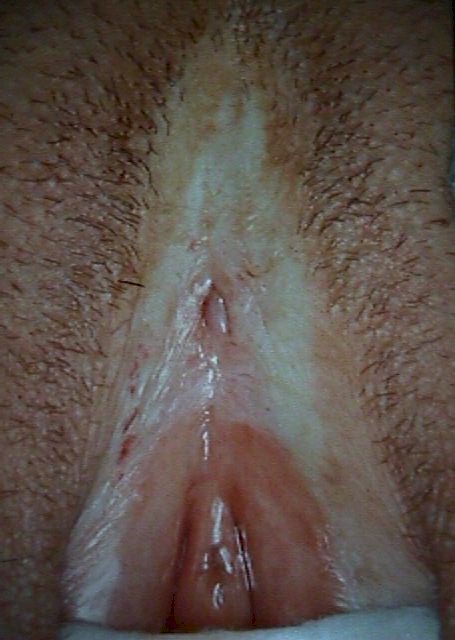|
Lichen Sclerosis |
 Lichen sclerosis is one form of vulvar dystrophy. With lichen sclerosis,
the skin of the vulva is too thin.
Lichen sclerosis is one form of vulvar dystrophy. With lichen sclerosis,
the skin of the vulva is too thin.
Clinically, women with lichen sclerosis complain of chronic vulvar itching and irritation. Tissues may be fragile, tear easily and result in superficial bleeding. Using only casual observation, the vulva may appear normal, but closer inspection will reveal a whitish discoloration and loss of anatomic differentiation of the vulvar structures.
It may be difficult, without a vulvar biopsy, to distinguish lichen sclerosis from the other forms of vulvar dystrophy (hypertrophic vulvar dystrophy and mixed dystrophy). For this reason, women suspected of having lichen sclerosis usually undergo vulvar biopsy to confirm the diagnosis.
Lichen sclerosis can occur in any age group, is not related to lack of estrogen, and its' cause is not known.
As a general rule, topical steroids give only very limited relief and if used for any length of time (more than 2 weeks) can make the condition worse because they tend to thin the skin even more. The important exception to this rule is the topical synthetic fluorinated corticosteroid, Clobetasol, which has been very effective in eliminating symptoms and restoring the normal anatomy of the vulva.
0.05% clobetasol propionate cream is applied to the vulva twice daily for one month, than at bedtime for one month and then twice a week for three months. It is then used as needed one or two times per week. Using this approach, 95% of patients will notice significant improvement and 75% will report complete remission of symptoms.
Traditional therapy consists of
2% testosterone propionate in petroleum jelly, applied 3 times a day for 3 to 6 months or until the symptoms are relieved. Then the applications are gradually reduced to a level of one or two applications per week.
